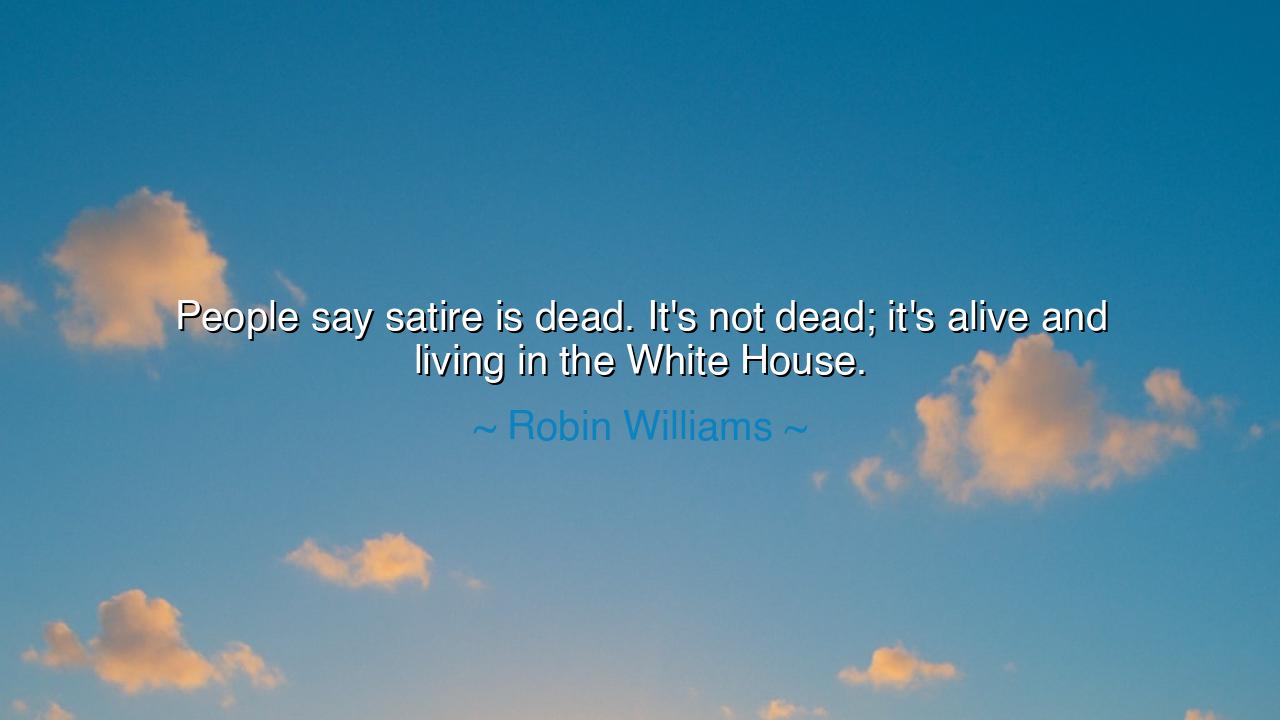
People say satire is dead. It's not dead; it's alive and living






The words of Robin Williams, “People say satire is dead. It’s not dead; it’s alive and living in the White House,” are both a jest and a revelation. With his wit, Williams exposed a truth as old as politics itself—that rulers often provide their own parody, and that the theater of government can sometimes outshine the stage of comedy. His words remind us that when leaders stumble, deceive, or display folly, they themselves become the living embodiment of satire.
In the spirit of the ancients, this saying echoes the role of the court jester, who spoke dangerous truths beneath the mask of laughter. Satire has always been the weapon of the powerless, a way to pierce the armor of kings and emperors without drawing a sword. Yet Williams’ words suggest something deeper: that when the rulers themselves act with absurdity, there is little need for the satirist—the joke is already written into the very fabric of power.
History offers proof. In the days of Nero, emperor of Rome, the people whispered that his rule was a tragic comedy, for he fancied himself a poet and performer while his empire burned. His excesses were so grotesque that playwrights dared not mock him openly, for he mocked himself by his very deeds. Thus, the empire’s highest office became its own stage of ridicule. Here, as in Williams’ words, satire was not invented—it was lived.
Yet satire, though it draws laughter, also carries a moral blade. To call the White House itself a source of satire is to challenge leaders to reflect upon their conduct. For when rulers become buffoons, the people suffer beneath their comedy. Satire, therefore, is not mere entertainment; it is a mirror held to power, exposing its vanity and reminding nations of the cost of foolishness at the highest seat.
So let this lesson endure: satire will never die, for folly is eternal, and power often breeds absurdity. But laughter is not enough. Beyond the jest lies the call to vigilance. For if the palace becomes a comedy, the people must decide whether to keep watching or to rise and demand a wiser play. In this, satire remains both shield and sword, the laughter that unmasks the truth.






LHLin Huynh
Robin Williams’ perspective makes me reflect on the current political climate and the role humor plays in it. If satire can thrive in the White House, what does that say about how we view leadership and governance? Is it a sign of a broken system, or does it indicate that satire is still a powerful tool for challenging authority?
LCLam caooo
Williams’ line is a powerful reminder of how satire can thrive even in the most unlikely places, like the political stage. But does this suggest that we’ve become desensitized to the absurdity in politics? If humor is now the standard response to political events, are we still able to take the issues seriously, or is everything being reduced to a punchline?
VH10- Nguyen Van Hoa
This quote made me think about how we often look to humor to process serious situations. When political figures themselves become the subject of satire, does it reduce the impact of the criticism or highlight the absurdity of the system? Can satire still be effective when it feels like it’s become an everyday part of the news cycle?
HHung
Robin Williams always had a sharp wit, and this quote reflects how satire can feel alive and well in the most unexpected places. But what does it mean when the lines between reality and satire blur? Can we still trust the political system when it seems like we're living in a constant performance for laughs?
MTNguyen Huynh Minh Thy
This comment from Robin Williams makes me wonder how satire can be used as a tool to criticize authority. When leaders themselves become the subject of mockery, does it undermine their credibility or simply reflect the dysfunction of the system? How do we balance humor and respect when dealing with political figures?